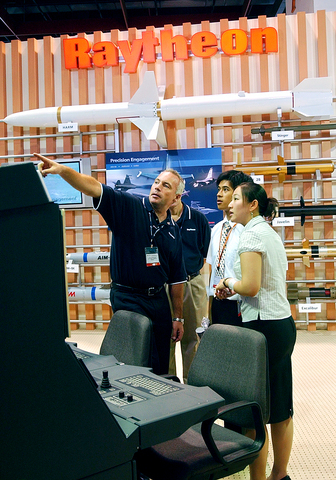Raytheon Co, the world's largest missile maker, said it's seeking partners among Taiwan companies and plans to set up a maintenance-repair center on the island.
"Over the past four decades, we just sold products to Taiwan, but have yet to establish partnership here," Torkel Patterson, president of Raytheon International, Inc, said yesterday in Taipei, where the company is holding an exhibition.
Raytheon is among 18 overseas and 56 local exhibitors participating Aug. 11-14 at the Taipei Aerospace and Defense Technology Exhibition.

PHOTO: AP
The company, which is based in Waltham, Massachusetts, is cooperating with Taiwan's government-backed Institute for Information Industry to jointly develop air traffic control systems, said Patterson, who didn't elaborate.
The Cabinet is proposing a budget of NT$480 billion (US$15 billion) for the next 15 years to buy submarines, anti-missile equipment and anti-submarine aircraft. The proposal, scaled back by 21 percent from a larger plan, is pending in Legislative Yuan after lawmakers balked at the original request.
"We hope to grab some of the orders," Patterson said, without elaborating.
Taiwan said it needs to increase defense spending because of rising tensions and military threats from China, which has 706 missiles aimed at Taiwan and is adding 120 more each year.
Excluding arms purchases, Taiwan has budgeted about NT$267 million for defense spending this year, or about 17 percent of the total.
The nation's annual defense budget last year accounted for 2.8 percent of gross domestic product, less than South Korea's 3 percent, the US's 4 percent, Singapore's 4.3 percent and Israel's 8 percent, the presidential office said in 2004.
Raytheon doesn't have a timetable for its Taiwan maintenance-repair center, Communication Manager Paul Stefens said. The company on June 23 received a US Air Force contract valued at US$752 million to provide Taiwan with an early-warning radar system.
The system will enable the Taiwan Air Force to detect and track ballistic and cruise missiles as well as aircraft and ships.

Quanta Computer Inc (廣達) chairman Barry Lam (林百里) is expected to share his views about the artificial intelligence (AI) industry’s prospects during his speech at the company’s 37th anniversary ceremony, as AI servers have become a new growth engine for the equipment manufacturing service provider. Lam’s speech is much anticipated, as Quanta has risen as one of the world’s major AI server suppliers. The company reported a 30 percent year-on-year growth in consolidated revenue to NT$1.41 trillion (US$43.35 billion) last year, thanks to fast-growing demand for servers, especially those with AI capabilities. The company told investors in November last year that

United Microelectronics Corp (UMC, 聯電) forecast that its wafer shipments this quarter would grow up to 7 percent sequentially and the factory utilization rate would rise to 75 percent, indicating that customers did not alter their ordering behavior due to the US President Donald Trump’s capricious US tariff policies. However, the uncertainty about US tariffs has weighed on the chipmaker’s business visibility for the second half of this year, UMC chief financial officer Liu Chi-tung (劉啟東) said at an online earnings conference yesterday. “Although the escalating trade tensions and global tariff policies have increased uncertainty in the semiconductor industry, we have not

Intel Corp has named Tasha Chuang (莊蓓瑜) to lead Intel Taiwan in a bid to reinforce relations between the company and its Taiwanese partners. The appointment of Chuang as general manager for Intel Taiwan takes effect on Thursday, the firm said in a statement yesterday. Chuang is to lead her team in Taiwan to pursue product development and sales growth in an effort to reinforce the company’s ties with its partners and clients, Intel said. Chuang was previously in charge of managing Intel’s ties with leading Taiwanese PC brand Asustek Computer Inc (華碩), which included helping Asustek strengthen its global businesses, the company

Power supply and electronic components maker Delta Electronics Inc (台達電) yesterday said it plans to ship its new 1 megawatt charging systems for electric trucks and buses in the first half of next year at the earliest. The new charging piles, which deliver up to 1 megawatt of charging power, are designed for heavy-duty electric vehicles, and support a maximum current of 1,500 amperes and output of 1,250 volts, Delta said in a news release. “If everything goes smoothly, we could begin shipping those new charging systems as early as in the first half of next year,” a company official said. The new